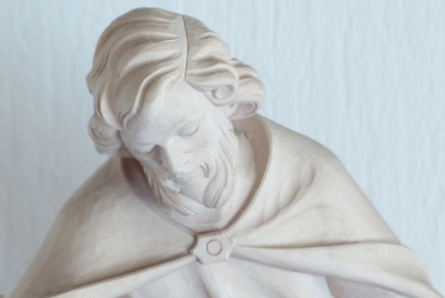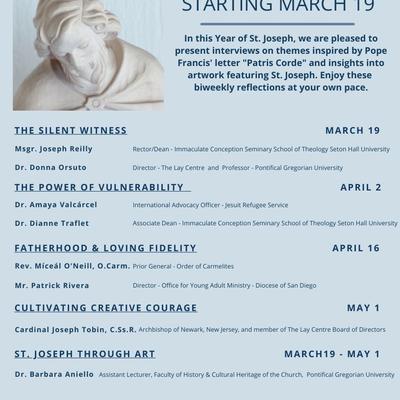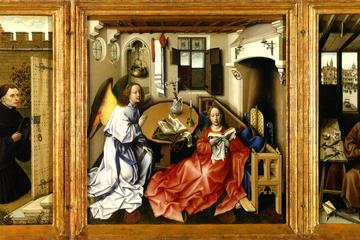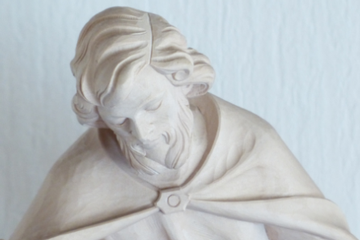
Reflections presented by Dr. Amaya Valcárcel and Dr. Dianne Traflet
The Lay Centre and Immaculate Conception Seminary School of Theology of Seton Hall University (ICSST) invite you to continue your journey of reflection and dialogue with Pope Francis’ apostolic letter “Patris Corde.”
In this second interview of the series “In the School of St. Joseph,” we reflect upon some situations of vulnerability we encounter in our world and how, following St. Joseph’s example, we can become guardians of the most vulnerable.
Fear, pain and lack of information can be sources of vulnerability. These are feelings that St. Joseph experienced in his concrete life. How, then, can he be a model for us in these troubled times?
In his apostolic letter “Patris Corde,” Pope Francis says Joseph is the guardian of the Church and he continues to protect it: “The Son of the Almighty came into our world in a state of great vulnerability. He needed to be defended, protected, cared for and raised by Joseph. God trusted Joseph, as did Mary, who found in him someone who would not only save her life, but would always provide for her and her child” ("Patris Corde," 5). Likewise, “every poor, needy, suffering or dying person, every stranger, every prisoner, every infirm person is ‘the child’ whom Joseph continues to protect.”
Our guests will speak of a “spirituality of vulnerability” — an expression of trust in God that is open to the wounds of others. We will also learn more about different global realities of migrants and refugees who, like the Holy Family, fled their homes in search of stability.
We hope the accompanying insights into sacred art depicting St. Joseph, offered by Dr. Barbara Aniello, will enrich your journey. The second work of art is “The Annunciation Triptych” (Mérode Altarpiece), by Robert Campin.
We invite you to read below the responses to questions posed to Dr. Amaya Valcárcel and Dr. Dianne Traflet, in the second in a series of brief interviews on topics to guide us in this Year of St. Joseph.
Dr. Amaya Valcárcel, an international advocate of the Jesuit Refugee Service, currently serves with the migrants and refugees section of the Dicastery for Promoting Integral Human Development, which is an action-oriented Vatican office, directed by the pope.
Dr. Dianne Traflet is associate dean and assistant professor of pastoral studies at ICSST. Dr. Traflet is also a Lay Centre alumna (1994) and a member of The Lay Centre’s Board of Directors.
In today’s world, there are many situations of vulnerability. What situations come to mind and where do you see a connection to St. Joseph?
Dr. Valcárcel: I think of St. Joseph as someone who trusted God in the midst of so many uncertainties. Like Abraham, he started walking, not knowing where God would lead him. On my path, I have met many refugees from Syria, the Democratic Republic of Congo or Afghanistan, who left their homes due to violence, with no certainty of returning (home).
After a long and tiring journey from Nazareth to Bethlehem, Joseph beheld the birth of the Messiah in a stable, since “there was no place for them” elsewhere (cf. Lk 2:7). Again, I have met many refugees who have kept their faith alive and, like Joseph, have been rejected many times: during the journey, upon arrival, during exile. Yet they keep going.
Recent events in Myanmar, mean that people are extremely vulnerable and suffering great brutality. They had trusted in a future of peace and openness to the world, but after the Feb. 1 coup, a friend wrote me: “We are surrounded by such brutality and constant reports of callous treatment of people. Yet, at the same time, deep calm, resilience and care among the people. All the time I sense buoyancy, trust and courage among so many. Happy to be here. I feel my life has prepared me for this.” To me, this is truly a living example of a follower of Joseph, guardian of the vulnerable.
Dr. Traflet: St. Joseph surrendered his own plans, moved in the darkness and walked unfamiliar paths, risking his life as he knew it to embrace his life as God desired it. As we experienced quarantines, isolation and contagion this year, we, too, have experienced the vulnerability of “not’s” — not knowing, not being in control and not being safe.
We have been vulnerable to the attack of a strange and potentially lethal virus, to the constant onslaught of information and misinformation, and to the reality of increasing societal violence and chaos.
We have experienced the vulnerability of letting go of our plans, well-travelled paths and secure lives. With God’s help, we have had to learn to adjust and re-adjust, and to be open to the grace of each pace and place.
St. Joseph went through a lot of troubles in his lifetime. How can we face our own vulnerability and problems today, both through action and prayer in these disquieting times?
Dr. Valcárcel: In my work, I am confronted daily with the causes of displacement, provoked by the world, such as the production of weapons of all kinds, the greed for minerals and the fight for power in places like North Kivu, Myanmar or Venezuela, to name a few.
Jesus said: “For apart from me you can do nothing” (Jn 15:5). In my experience, in the so-called humanitarian world, it is a risk to try to bear fruit by one’s self. It is all about abiding in the vine, in God, since we are only branches, and as such we can “bear much fruit.”
Refugees give me hope: a mother striving to offer education to her children, normalizing their broken lives. I also find hope in those who keep faithful to building the Kingdom of justice and peace, sometimes risking their own lives. I pray for refugees with an image beautifully offered in Psalm 91:4: “He will cover you with his feathers, and under his wings you will find refuge.”
Dr. Traflet: “Vulnerable” comes from the Latin meaning, “wound.” Joseph’s troubles are related to his wounds, including betrayal and confusion, fear of danger to his family, rejection and the reality of “no room at the inn;” displacement in unfamiliar places; terror of the unknown and anguish in the search for the Son of God.
Joseph did not build a protective barrier around his heart where he could be immune from more wounds and pain. Rather, his heart remained open and vulnerable to the sting of injustice and hatred. Precisely because of his vulnerability, he was capable of realizing and experiencing the wrongs around him in ways that were disquieting and unsettling.
Vulnerability implies such willingness to serve with a disquieted heart and to come to a full stop, and proceed at full speed ahead when the circumstances require it.
Accompaniment and service are important aspects of St. Joseph’s life. What do these words mean to you?
Dr. Valcárcel: My thoughts and prayers again turn to Myanmar, to Sister Ann Rose Nu Tawng, a living example of accompaniment and service. Free from fear, this gift of freedom clearly comes from God. Simple, yet so strong, she is able to protect others because she herself is protected by God.
Sometimes our actions are very poor, but “Saint Joseph reminds us that those who appear hidden or in the shadows can play an incomparable role in the history of salvation” ("Patris Corde," Introduction). Pope Francis’ words console me: “Our lives are woven together and sustained by ordinary people, people often overlooked. People who do not appear in newspaper and magazine headlines, or on the latest television show, yet in these very days are surely shaping the decisive events of our history” (Meditation in the Time of Pandemic, March 27, 2020).
Dr. Traflet: At the heart of “accompaniment” is the word “pan” or bread, implying nourishment. Joseph accompanied Mary and the Bread of Life within her, even as he provided bread for mother and child. While the chaos and the hatred of the world could have embittered him or made him powerless or afraid to act, Joseph continued a pilgrimage of accompaniment. He invited others, often the very vulnerable, into his familial life: the shepherds, vulnerable in their poverty and station in life; the wise men, vulnerable in their defiance of Herod; and Anna and Simeon, vulnerable in their age and in their waiting.
The vulnerability of accompaniment and service imply a letting go of our own egos so as to humbly walk with others; a letting be, so as to treat others with dignity, and never as an object; and, a letting down of one’s defenses, where we drop our invisible masks to be totally authentic and transparent.
“Being guardians of the most vulnerable” can be a daunting undertaking. How can St. Joseph’s example inspire us, especially when “the other” is vulnerable?
Dr. Valcárcel: The vulnerable, too, can be guardians. We can learn so much from refugees and migrants, who have lost everything, but have hopes and aspirations. One of my friends in Myanmar also said in these days: “We are living with so many uncertainties, only faith and hope give us the courage to continue.” This is very powerful when we imagine the context there.
I believe that our service and presence in the midst of refugees, if rooted in fellowship with Christ, can be a prophetic witness to God’s love for us.
Dr. Traflet: Scripture does not tell us much about Joseph except that he was a “just” man, and this is the key for Joseph’s guardianship. He guarded the Son of God with justice and humility. Closer to our times, St. Mother Teresa of Calcutta served the most vulnerable in Calcutta, considering her ministry a privilege. We may be inspired by both saints that guarding the vulnerable means constantly beholding the face of God and realizing our role cannot be fulfilled without the strength and love of God.
St. Joseph was a man of action. In a difficult situation, he was inspired by God, but did not wait for a miracle. He solved the problem, for example, making sure his family was safe. How and where do we find this kind of inspiration, resilience and bravery today?
Dr. Valcárcel: I see this bravery in every single refugee and migrant I cross paths with. We should welcome them with open arms. A very inspiring young Filipino woman comes to mind: She gave up her professional career to pay for her brother’s university studies. She is a domestic worker in Italy and, in her free time, she reads many books. Her name is Precious, this name echoes who she is — a treasure for those surrounding her.
Dr. Traflet: Joseph’s vulnerable situations did not prompt him to aloof or defiant inaction, as if saying: “This isn’t what I signed up for or expected!” Rather, Joseph’s actions conveyed a humble spirit and true courage, the root of which is “cor” or heart. Joseph had the privilege of holding Jesus so close that he could feel the heartbeat of the Son of God. This proximity engendered and emboldened Joseph’s love, as it does our love.
In these difficult days, we often have not been able to draw close to others, and yet, we know that close to God, we can love with Divine love, even at a distance. In prayer, we have made heart-wrenching decisions on how to keep loved ones safe and well. We have prayed for one another and with one another, even at a distance, and that has turned this difficult quarantine into an unexpected pilgrimage.



